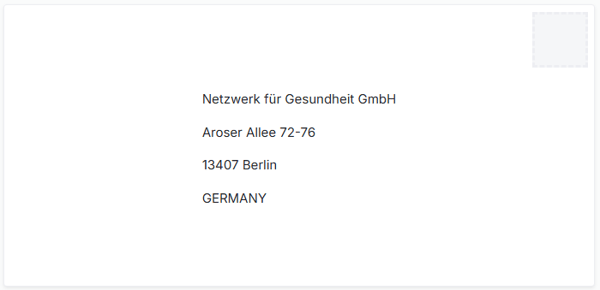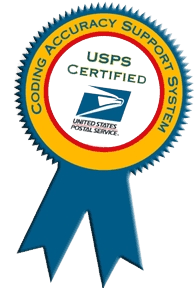This guide provides a comprehensive overview of German address formatting, postal code structures, and localization practices. It includes information on postal services, languages, time zones, and address validation standards across Germany.
Address Format
Structure for standardized German postal addresses.
- Organization
- Building
- Thoroughfare PremisesNumber SubPremisesLevel SubPremises
- PostBoxType PostBoxNumber
- PostalCode Locality
- Country
Address Verification Data
German postal addresses verification data.
| Available: | Yes |
| Does the country use Postal Codes: | Yes |
| PO Box Indicator: | Postfach, Postlagernd, Packstation, PO Box |
| ISO-2-Code: | DE |
| ISO-3-Code: | DEU |
| Phonecode: | 49 |
Address Example
Example of standardized German postal addresses.

Country Info
Full Country Name: Federal Republic of Germany (Bundesrepublik Deutschland)
| Country Alpha-2 code | DE |
|---|---|
| Country Alpha-3 code | DEU |
| Numeric Code | 276 |
Timezone
German Time Zone Details
| Time Zone | UTC | DST |
|---|---|---|
| Central European Time (CET): | UTC+1 | UTC+2 |
Official Language
The official language is German. Minority languages such as Danish, Sorbian, Frisian, and Romani are recognized in specific regions.
Fun Fact
- Germany is slightly smaller than the U.S. state of Montana in total area (~357,000 km²). (CIA)
- It has one of the oldest continuously used national icons: the German coat of arms (the eagle) is said to date back to ~1200. (CIA)
- Germany is the most populous country in the European Union. (IIASA User Page)
- Almost 30% of Germany’s GDP comes from industry, while services account for the majority (~70%). (pik-potsdam.de)
- Germany has about 2,389 km (1,484 miles) of coastline, along the North Sea and Baltic Sea. (IIASA User Page)
- It shares land borders with nine countries (IIASA User Page)
- Life expectancy is high: as of recent estimates, total life expectancy is ~81 years, women notably higher than men. (Wikipedia
Postal Authority
The Deutsche Post AG is Germany’s primary postal service provider. It manages domestic and international mail and parcel delivery and operates under the DHL brand for global logistics. Deutsche Post ensures universal postal service across all 16 federal states and offers digital and financial services in addition to traditional mail operations.
Reference: https://www.deutschepost.de
Postal Code Format
In Germany, postal codes consist of 5 digits without any delimiter and are placed to the left of the locality name. The first two digits generally represent a larger postal region, while the remaining three digits narrow down the delivery area to a specific city district or town.
Example:
40436 Düsseldorf
Postal Data & Certification
Deutsche Post Direkt offers multiple data sets to support the verification and completion of Germany address data. These distinct data sets include:
- Addresses: The main address database for Germany with over 25 million address records.
- Mailboxes: Postfach (PO Box Addresses), Packstation, and Postfiliale addresses.
- MajorCustomers: Data on special postal codes assigned to bulk recipients.
- AdditionalRoads: Alternate variations and languages as well as towns outside of country borders.
Melissa uses and combines these data together in order to provide a single address verification solution.
Name Conventions
Population Names
In Germany, Names are written in German/Latin, in the western naming format, and contain diacritics such as umlauts (ä, ö, ü) and the ligature ß (rendered as "SS" in uppercase).
[opt: title/ honorific] [given name] [opt: middle given name(s)] [FAMILY NAME] [opt: suffix /post nominal]
-Herr -Kfm. Peter Gößmann jun.
-Frau Lena GOESSMANN
-Herr Hanz Schäfer & Dipl. -Ing. Enna Schäfer
Titles and honorifics (e.g., Dr., Prof., Dipl.-Ing.) are legally part of a person’s name and frequently used in both social and professional settings. Names may also reflect historical nobility through particles like von or zu, though these no longer confer legal status. Names in Germany are traditionally patrilineal, with spouses and children often adopting the family surname. However, it is legal for each parent to retain their surname or use a hyphenated combination.
Key naming rules include the requirement that first names must clearly indicate gender; if the first name is unisex (e.g., Kim), a gender-defining middle name is required. Names must be approved by the Standesamt, and names that are surnames, brand names, objects, or offensive may be rejected. Academic and professional titles, such as Dr., Prof., or Dipl.-Ing., are legally part of the name and commonly used, and it is common to see multiple titles in succession, especially in academia. Noble particles such as von, zu, and Freiherr are retained in names but no longer imply nobility.
Organizational Names:
Under the German Commercial Code (Handelsgesetzbuch), business names must reflect the nature of the enterprise and include the legal form. Common suffixes include:
- GmbH (Gesellschaft mit beschränkter Haftung – limited liability company)
- AG (Aktiengesellschaft – stock corporation)
- KG (Kommanditgesellschaft – limited partnership)
- OHG (Offene Handelsgesellschaft – general partnership)
- KGaA (Kommanditgesellschaft auf Aktien – partnership limited by shares)







